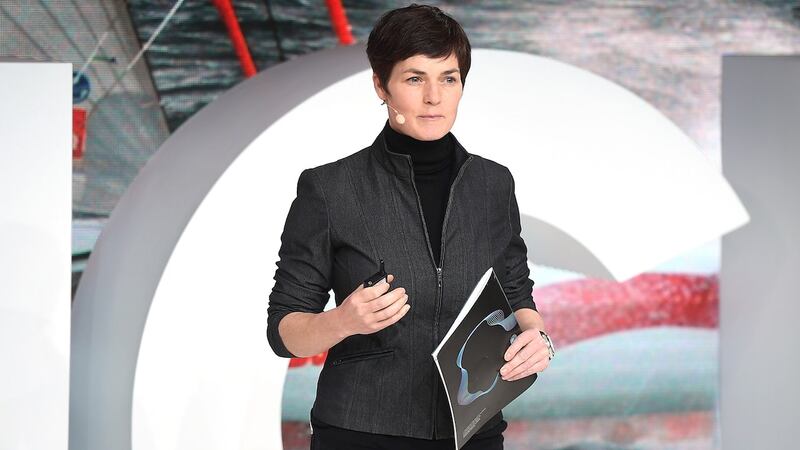
The Business of Fashion
Agenda-setting intelligence, analysis and advice for the global fashion community.

Agenda-setting intelligence, analysis and advice for the global fashion community.

The author has shared a YouTube video.
You will need to accept and consent to the use of cookies and similar technologies by our third-party partners (including: YouTube, Instagram or Twitter), in order to view embedded content in this article and others you may visit in future.
OXFORDSHIRE, United Kingdom — For Dame Ellen MacArthur, overwhelming obstacles are motivators, not deterrents. Back in 2005, she made history on the open seas by becoming the fastest person to ever sail solo, non-stop, around the world in just over 70 days. In a presentation at VOICES, BoF’s gathering for big thinkers in partnership with QIC Global Real Estate, she said it was difficult to describe the adrenaline-fuelled, life-changing experience.
But that historical journey taught her an unexpected lesson. “When you are 2,500 miles away from the nearest town and what you have on that boat is all you have, you really understand what finite means," she said. "What we have is all we have; there is no more.”
MacArthur realised that the global economy is really no different from the boat: “We have finite materials available to us." But instead of letting that deter her, MacArthur dove headfirst into the problem. Since 2010, MacArthur has worked through her influential namesake foundation with governments and businesses across industries to argue for the implementation of a circular economy, in which resources are designed for multiple life cycles, instead of simply disposed of after use.
"My fear of what will the future look like turned into the biggest opportunity I have ever laid eyes on," she said. “There is a way whereby we can run our global economy in a restorative and regenerative way. We can switch from linear to circular and we can build it so it really can run in the long term.”
There is a way whereby we can run our global economy in a restorative and regenerative way.
MacArthur is now focusing her efforts on the fashion industry. According to the Ellen MacArthur Foundation’s new report, "A New Textiles Economy: Redesigning Fashion's Future,” released on Wednesday, 73 percent of garments end up in landfills or are incinerated each year and less than 1 percent of materials used to produce clothing are recycled. The production of clothing has doubled to over 100 billion units in the last 15 years, and more than half of fast fashion is disposed of in less than a year.
The current system is costing consumers about $500 billion in value through the disposal of unwanted garments. “If you can resell the same product, if you can provide it as a service, if you can remanufacture it, if you can de-componentise and then — when it is no longer the right thing to have or technology has moved one — you design it so you can get out those materials and feed them into the next pair of socks or the next iPhone," said MacArthur. "You are building for a system, a system that can run in the long term.”
How can fashion start to build this system essentially from scratch? MacArthur laid out several key points. First, brands need to phase out damaging materials and processes and replace them with biodegradable fibres and safe material cycles. Next, the industry needs to promote the increased utility of garments through, for example, rental and resell models. To that point, designers need to optimise the construction of garments to facilitate future recycling and take advantage of innovative textiles, such as those made from wood pulp and reconstituted cotton. And finally, the industry needs to work together.
“If we don’t work together to make this happen, then we won’t have the economies of scale and that’s absolutely vital,” said MacArthur. “There is some amazing stuff going on within the fashion industry. Let’s raise the level of ambition.”
To learn more about VOICES, BoF's annual gathering for big thinkers, in partnership with QIC Global Real Estate, visit our VOICES website and click here to request an invitation to attend.
Related Articles:
[ 5 Sustainability Threats Facing FashionOpens in new window ]
[ An Alternative To Consumerism Does Exist: The Performance EconomyOpens in new window ]
[ Patagonia’s Circular Economy StrategyOpens in new window ]
Fashion’s biggest sustainable cotton certifier said it found no evidence of non-compliance at farms covered by its standard, but acknowledged weaknesses in its monitoring approach.
As they move to protect their intellectual property, big brands are coming into conflict with a growing class of up-and-coming designers working with refashioned designer gear.
The industry needs to ditch its reliance on fossil-fuel-based materials like polyester in order to meet climate targets, according to a new report from Textile Exchange.
Cotton linked to environmental and human rights abuses in Brazil is leaking into the supply chains of major fashion brands, a new investigation has found, prompting Zara-owner Inditex to send a scathing rebuke to the industry’s biggest sustainable cotton certifier.